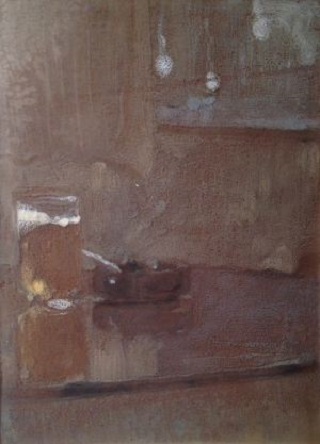Their 2 major food groups: Nicotine and alcohol
''Beer and Cigarette'' (oil on plexy), by MICHAEL DOYLE, at Patricia Ladd Carega Gallery, in Center Sandwich, N.H.
It wasn't that long ago that millions of workers daily repaired after their shifts to smoky joints like the one that this picture recalls. These places were very close to offices or factories. Indeed, the bars were often scientifically located specifically to serve this or that local big company.
Employees could chain-smoke simply by breathing in the air of the bar. For hours, they'd drink and do supplemental smoking. Then, especially if it were late in the week, repeat the process all over again the next day. Now folks can't smoke in bars, which reduces the desire for drink, which reduces the desire to smoke. (The big exception: The giant bars known as casinos, where state taxing authorities, and income-and-sales-tax-hating citizens, want the cross-promotional addictions of booze, cigarettes and gambling to keep pumping up state budgets from states' draw on casino revenues.)
For that matter, plenty of people went to bars on their "lunch break,'' and unless they were falling down drunk when they returned to the offices or factory, it was tolerated -- indeed, expected. Executives did it, too, albeit more likely ordering cocktails and bottles of wine than what their lackeys bought, which was mostly (bad) beer.
About half the news desk staff at the old Boston Herald Traveler, where I worked, would go next door to a joint called Foley's and toss back a few at their "lunch,'' which came at mid-evening. (It was a morning paper so the paper was mostly produced between about 6 p.m. and 2 a.m.).
The daily heavy-drinking habit, along with relentless deadlines, rapidly aged the editors. Many of those who I thought were around 60 were in fact about 40. But many were addicted to the daily adrenaline of deadines and breaking news (much of which was suffused with false urgency).
All in all, a lousy way to live, but we all got stories about at least mild depravity out of it. Some of us even still remember them.
--- Robert Whitcomb
